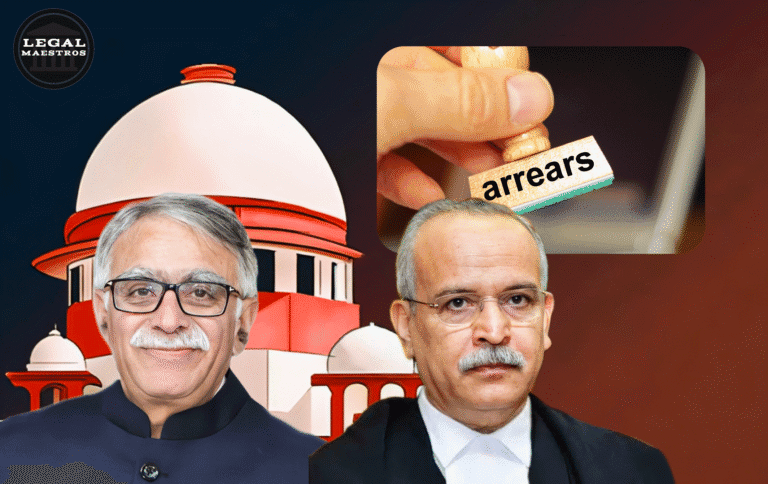
Liability of Retired Partners Under Negotiable Instruments Act and Partnership Act: A Legal Analysis of Shivappa Reddy vs. S. Srinivasan (2025 INSC 729)
Introduction
A key verdict that explains the legal standing of retired partners in cases involving dishonoured checks was handed down by the Supreme Court of India in the matter of Shivappa Reddy vs. S. Srinivasan. The ruling dealt with crucial articles of the Negotiable Instruments Act, 1881 and the Indian Partnership Act, 1932. The judgment provides valuable insights into the ways in which statutory compliance and evidentiary standards influence the culpability of individuals who were previously engaged with a partnership company. As a result of this case, the question arises as to whether or not a former partner can be held accountable under Section 138 of the Negotiable Instruments Act in the event that the procedural conditions for retirement under the Partnership Act are not properly satisfied.
A Brief Overview of the Situation
Shivappa Reddy, the appellant, used Section 200 of the Code of Criminal Procedure to file a criminal complaint against M/s AVS Constructions, a registered partnership firm, and its partners, including the respondent, S. Srinivasan. The complaint was filed against all of the participants in the partnership. The complaint was brought about as a result of the dishonoring of twelve cheques, each of which was worth ₹50 lakhs, with a total value of ₹6 crores coming from the company. These cheques were issued as a refund of a property sale consideration. These cheques were personally signed by S. Yuvaraju, who is not only one of the partners but also the authorized signatory for the company. The bank marked the checks as “payment stopped,” indicating that they were not eligible for payment.
It was determined that no payment was paid after legal notice was served to all of the accused, including S. Srinivasan. The appellant was prompted to begin proceedings in accordance with Section 138 of the Negotiable Instruments Act as a result of this. Following the trial court’s decision to take cognizance and issue a summons, S. Srinivasan submitted a petition to the Karnataka High Court under Section 482 of the Criminal Procedure Code. In the appeal, he asserted that he had retired from the company a significant amount of time prior to the issuance of the cheques, and had therefore been exempt from liability.
For More Updates & Regular Notes Join Our Whats App Group (https://chat.whatsapp.com/DkucckgAEJbCtXwXr2yIt0) and Telegram Group ( https://t.me/legalmaestroeducators ) contact@legalmaestros.com.
The Decision of the High Court
Srinivasan’s petition was granted by the Karnataka High Court, which resulted in the dismissal of the proceedings against him. The High Court came to the conclusion that there was no legally enforceable obligation or liability against him because the checks were not signed by him and he had already retired from the company and was no longer employed there. On the basis of the assertion that he had ceased to be a partner as of April 1, 2015, the High Court relied on the fact that the cheques in question were issued a significant amount of time after that date.
The Supreme Court’s Review and Analysis
The appeal that was submitted by Shivappa Reddy was granted by the Supreme Court since it did not agree with the findings that were reached by the High Court. Regarding the statutory framework that governs the retirement of partners and the liabilities of people in accordance with the Negotiable Instruments Act, the highest court in the land conducted an in-depth investigation.
The provisions of the law that are involved
The interpretation and implementation of Sections 138 and 141 of the Negotiable Instruments Act, as well as Sections 32, 62, 63, and 72 of the Indian Partnership Act, were the primary focuses of investigation in this case.
In accordance with the provisions of Section 138 of the Negotiable Instruments Act, it is a criminal offense to dishonor a check due to a lack of money or to halt payment, provided that certain procedural conditions are satisfied. According to Section 141, in the event that an offense is committed by a company or firm, the liability extends to each and every person who was in charge of and responsible for the conduct of the company or firm at the time the offense was committed.
In the Indian Partnership Act, Section 32 addresses the topic of a partner’s departure from the partnership. Notice of a partner’s retirement must be submitted to the Registrar of Firms in accordance with Section 63 of the Act. According to Section 72, such a notice is required to be published not only in the Official Gazette but also in a vernacular daily that is circulated in the vicinity of the company’s primary place of business.
Failure to comply with the requirements set out by the statute
It was highlighted by the Supreme Court that the simple act of signing a retirement deed or an internal agreement is not sufficient to release a partner from obligation, unless the appropriate notice is published and publicized in compliance with the law. In this particular instance, the respondent asserted that he retired in the year 2015; however, the Registrar of Firms did not record this retirement until the year 2020, which was a significant amount of time after the checking was issued. In addition, there was no evidence offered to support the claim that the mandatory public notice was ever distributed.
At the same time, the court discovered that the respondent was still identified as a partner on Form-A, which the appellant had gotten from the Registrar in the year 2020. This demonstrated that, according to the official records, the respondent remained to be a partner at the time that the checks were issued and at the time that legal notice was served against them.
Vicarious liability and Section 141 of the Civil Code
After reviewing the complaint, the Supreme Court came to the conclusion that it made it abundantly evident that all partners, including the respondent, were actively involved in the day-to-day operations of the company and had jointly guaranteed repayment. Additionally, it was asserted that the respondent was present throughout the signing of the checks and gave the appellant assurances that they would be repaid upon receipt. During the stage of cognizance, these assertions were sufficient to justify the application of Section 141 of the National Insurance Act.
In accordance with Section 141, the fact that the checks were signed by a different partner did not exonerate the respondent from any responsibility. In a reiteration, the court emphasized that the accountability under Section 138 read in conjunction with Section 141 is not restricted to the individual who signed the check, but rather encompasses individuals who are in charge of the business of the company.
Misuse of Section 482 of the Criminal Procedure Code
The decision made by the High Court to dismiss the proceedings under Section 482 of the Criminal Procedure Code was criticized by the Supreme Court. The purpose of this clause, it was reaffirmed, is to avoid abuse of process or to promote the goals of justice; but, it is not meant to adjudicate contested questions of fact, particularly those that require a trial and evidence.
In this particular instance, the questions of whether or not the respondent had legitimately resigned and whether or not he was in command of the company at the time the offense was committed were a mixture of legal and factual inquiries. The investigation of the documents and evidence was necessary for these, and the trial court was the one who should have carried it out. It was for this reason that the order issued by the High Court was overturned since it prematurely sped up the procedure of the trial.
The decision that was made in the case of Shivappa Reddy vs. S. Srinivasan serves as a powerful reminder of the legal requirements that are associated with transactions involving partnerships and cheque, respectively. This underlines the fact that a partner cannot simply escape obligation by declaring retirement without following the statutory formalities that are required by the Partnership Act. In addition, the ruling confirms that the criminal justice system should not be bypassed by means of summary proceedings in accordance with Section 482 of the Criminal Procedure Code where the subject in question contains contested facts.
As a result of this verdict, the notion that liability under the Negotiable Instruments Act is a serious matter that must be tested through a thorough trial when prima facie evidence is present has been upheld. It provides a clear message that statutory demands cannot be evaded by backdated documents or procedural shortcuts, and it emphasizes the importance of conducting thorough research when it comes to the formalities associated with retirement arrangements.





